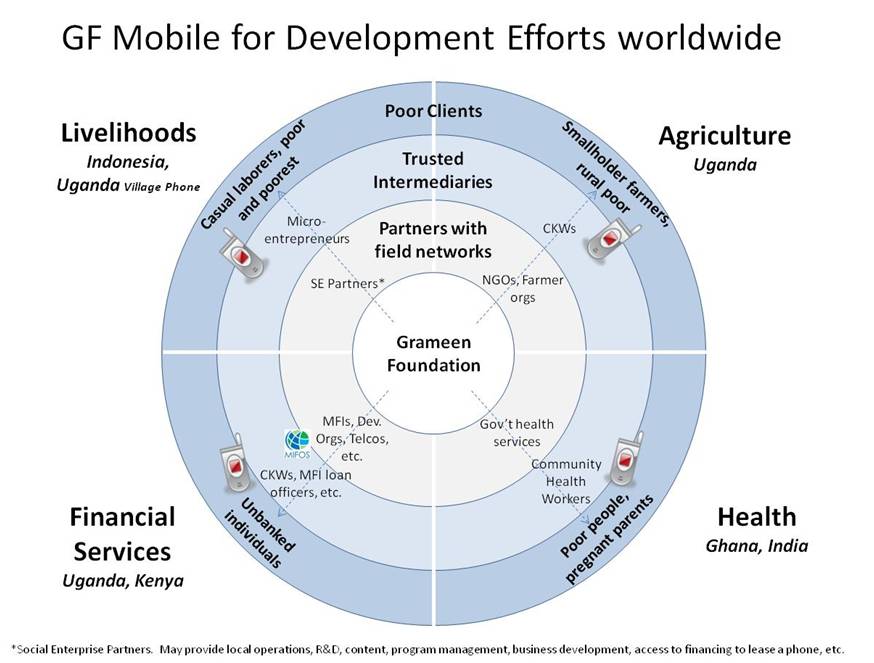Heather Thorne, Director of ICT Innovation at Grameen Foundation, closes her series of three blogs on our approach to M4D with a description of our work in the field and call for partnerships.
Today, GF operates three regional innovation hubs – AppLabs – in Uganda, Indonesia and Ghana – with additional M-Health efforts underway in India, Mobile Financial Services efforts in Kenya, and new health and agriculture efforts planned in Latin America.
- Uganda – Agriculture and mobile financial services. Nearly 300 Community Knowledge Workers (CKWs) are currently deployed reaching >14,000 farmers with the goal of increasing their adoption of improved farming practices; utilizing support from Bill and Melinda Gates Foundation (BMGF) and MTN Uganda to scale this agriculture program nationwide and beyond. Mobile Financial Services work is in early stage development.
- Indonesia – Entrepreneurship and livelihoods. Over 5,700 micro-entrepreneurs are working in West Java, selling electronic airtime top-up and piloting social applications/services; reaching over 600,000 customers. Approximately 50% of the entrepreneurs who have stayed in the program over 4 months (~15% of the total) have nearly doubled their average daily income. This program utilizes funding and other in-kind support from Qualcomm Wireless Reach, and a partnership with telecom provider BTEL.
- Ghana - Mobile Health. “MOTECH in Ghana” is a service that strives to increase the quality and quantity of prenatal care in rural Ghana. “Pregnant parents” receive regular messages on their mobile phones designed to educate them about a healthy pregnancy and catalyze clinic visits for prenatal care. Healthcare workers use the system to track who has received care and who may be in need of care. Administrators at Ghana Health Service can review reports to identify where to focus improvements in health coverage.
A conceptual framework for all of GF’s M4D efforts is shown below:

In each of these innovation centers, GF has developed deep vertical knowledge, but also employs a common innovation process that leverages our expertise in needs assessment for the poor, rapid prototyping, user-centric development, pilot testing, launching new products and services, and supporting them in market.
Critical to creating social impact, and doing it in a sustainable way, is assembling a collection of partners who can contribute unique value, and derive unique perceived value from the effort, while collectively focusing on meeting the needs of the poor. Some examples of how value may be contributed and derived include:

In order to reach millions of measurably poor people with mobile services designed to improve their lives and livelihoods, practitioners will need to develop enduring relationships with not only the partners above, but also multi-lateral organizations, research institutions, academics, think tanks, funders for ongoing innovation and for exit strategies, and regulators. We believe that public-private partnerships, and multi-stakeholder management are key to addressing the multiple dimensions of poverty.
Going forward, our vision is for GF’s AppLabs to serve as a platform for broader scale and deeper innovation, allowing for ongoing validation and testing of new ideas that can be put through our rigorous rapid prototyping and in-depth piloting approach. For the most promising concepts that emerge from the pilot process, we will seek additional funding from other sources to develop, test, launch, measure impact, and scale the services via our partners within each target country. We will also work with our other AppLabs, within those countries’ intermediary networks, and among partners to maximize reach and impact.
With over 8 years of learning about what works (and what doesn’t) in social-mobile innovation, on-the-ground presence in multiple verticals and geographies, and a deep understanding of the needs of the poor and how to build products and services for them, GF intends to continue pushing the thinking in the M4D space. However, we alone cannot create the change we seek in alleviating poverty. We need others to partner with us, who share a vision for what is possible, and who will bring their talent and resources to bear.


Very nice post and a good explanation of how partners, at each level, fit in to the overall framework of Grameen’s M4D strategy.